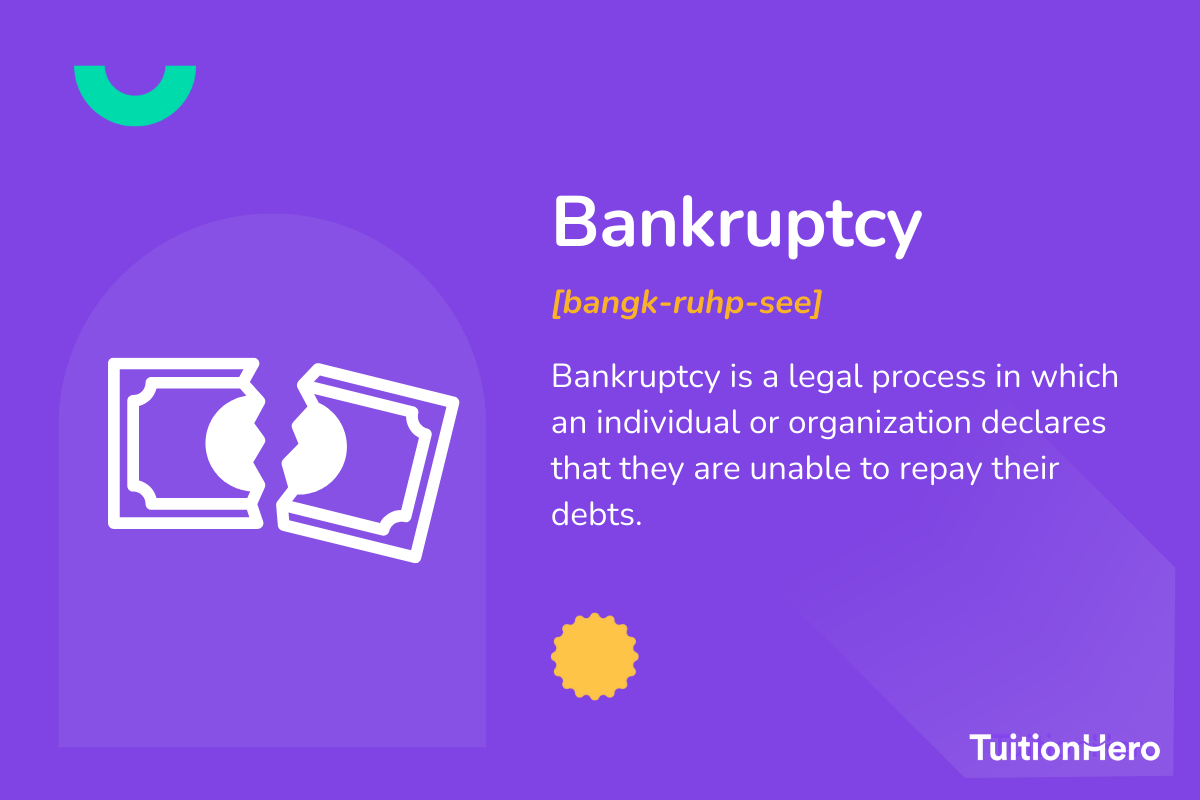Advertiser Disclosure
Last update: November 17, 2024
6 minutes read
What is Bankruptcy?
Learn what bankruptcy is, the types of bankruptcy, and how it impacts debt.

By Brian Flaherty, B.A. Economics
Edited by Rachel Lauren, B.A. in Business and Political Economy
Learn more about our editorial standards



By Brian Flaherty, B.A. Economics
Edited by Rachel Lauren, B.A. in Business and Political Economy
Learn more about our editorial standards
Ever feel like you’re stuck in debt and want to find a way out? Well, you might want to see if bankruptcy is an option for you. Bankruptcy is a legal way to deal with a ton of debt and have your legal obligations removed. It gives you a chance to start fresh if you're facing big financial problems, but there are tradeoffs, like a massive impact on your credit score. You'll find out how it works, the steps you need to take, and what it means for you. We'll also talk about other options you might want to consider instead of bankruptcy.

Key takeaways
- Bankruptcy is a legal process to help clear overwhelming debt
- Not all debts are dischargeable in bankruptcy, like alimony, student loans, and certain taxes
- Bankruptcy can seriously affect your credit score and stay on your credit report for up to 10 years
What is bankruptcy?
Bankruptcy is a formal process for people or businesses struggling to pay their debts. According to federal law, it’s a way to either get rid of the debt or figure out a plan to pay it back through selling assets or coming up with a new payment plan.
In supporting some close friends and family through financial troubles, I’ve found that bankruptcy can come with feelings of shame as if you’ve “failed” by not being able to pay your debts back as planned. It’s important to remember that bankruptcy is specifically designed to help you out if you’re in over your head. Think of it like a reset button, allowing you to responsibly sort out your financial future - and there’s definitely no shame in being responsible.

How does bankruptcy work?
When you're stuck in debt with no way out, bankruptcy can be that helping hand. To get started, you file a petition in federal court - you'll likely need a lawyer for this.
If you're thinking about this, it's important to know there are different types of bankruptcy, and not all debts disappear! Bankruptcy is really only best for people who can't afford to make their payments and have a lot of debt.
What types of bankruptcy can I file?
There are different types of bankruptcy, each with its own rules:
- Chapter 7 Bankruptcy: This allows you to sell your assets to pay your debts, kind of like having a garage sale. Chapter 7 bankruptcy does not require a repayment plan.
- Chapter 11 Bankruptcy: This is primarily geared towards businesses, and allows the business to restructure its debt to survive tough times. This type requires you create a payment plan with creditors.
- Chapter 13 Bankruptcy: This is for people with a regular income. It's like following a money plan or a financial diet and involves creating a payment plan with creditors.
If you have a lot of debt, Chapter 7 is a common choice for getting help because it doesn’t require a repayment plan. It's often the best option for finding relief from debt, but make sure to consult a lawyer and financial advisor before choosing which type to file.
What happens to my property in bankruptcy?
When you go for Chapter 7, you might need to give away some things, but not everything. Stuff like your primary residence, clothes, and a personal vehicle (up to a certain value) usually stays with you—these items are considered 'exempt.' But the specifics of exempt property can vary state by state, so make sure to discuss your situation with an attorney.
How long will bankruptcy affect my credit?
Bankruptcy sticks to your credit report, telling lenders about your past money troubles. This will make it difficult for you to obtain new loans for a long time, so make sure bankruptcy is really the right option for you.
- Chapter 7 sticks for ten years.
- Chapter 13 sticks for seven years.

TuitionHero Tip
Having a bankruptcy notice on your credit report can make it tough when you're trying to get a new loan or mortgage, so make sure to consider your need for future credit when weighing bankruptcy.
What can't bankruptcy do for me?
Bankruptcy doesn't cover everything. Some debts, like alimony, child support, student debt, and most taxes, stay even if you declare bankruptcy.
If you owe money on something specific, like a car, and it's used as collateral, bankruptcy won't make that debt disappear. In those cases, creditors can still take back the asset that’s tied to the debt, like your car or home. Bankruptcy is designed to stave off a foreclosure or asset seizure, but you still have to restructure your payment plan with your creditor if you want to keep those assets.
Are there alternatives to bankruptcy?
Bankruptcy can allow you to hit the reset button, but there are other options to consider. You could talk to your creditors and try to get them to lower what you owe - this is called settling.
Another choice is to adjust the terms of your loan to make it more manageable. If you're dealing with tax debt, you might be able to work out a deal with the IRS to create a payment plan.
But be careful—there are scammers out there who might try to take advantage of your tough situation. Many companies will offer to help you negotiate with creditors on your behalf, for a fee.
Some of these companies are legitimate, but be aware that this might have an effect on your credit score. If something seems too good to be true, it probably is.
Watch out for debt settlement companies who promise to clear all your debt, who charge very high fees, or who don’t disclose the effect on your credit. Let's avoid those risks and find a safer way to get back on track with help from reliable sources.
If you're facing bankruptcy, it's okay to ask for help. At TuitionHero, we're here to help you navigate through these challenges.
Compare private student loans now
TuitionHero simplifies your student loan decision, with multiple top loans side-by-side.
Compare Rates
Dos and don'ts of filing for bankruptcy
Navigating bankruptcy involves knowing what moves can help and what might make things worse. Paying attention to the details is crucial. Here’s a quick guide to know what to do and what to avoid when filing for bankruptcy.
Do
Gather detailed financial records
Consider alternatives to bankruptcy
Get credit counseling
Be honest in your filings
Attend all required legal meetings
Don't
Hide assets or debts
Make big purchases before filing
Ignore lawsuits from creditors
Transfer money to friends or relatives to hide it
Rack up more debt just before filing

Advantages and disadvantages of bankruptcy
Bankruptcy is a big decision—it can either help your finances or cause problems. It's important to think about the positives and negatives before you make that choice.
- Releases you from overwhelming debts.
- Staves off foreclosure on your home.
- Stops wage garnishment and getting harassing calls from creditors.
- Offers a financial clean slate.
- Severely affects your credit score.
- Puts valuable assets at risk.
- Not all debts can be discharged.
- Public record of your financial crisis.

Why trust TuitionHero
At TuitionHero, we make college finance easy. We help you with loans, grants, and financial aid so it's not confusing. Even though the Stafford Loan time is done, we're still here to help. We'll support you with Private Student Loans and FAFSA assistance, so you can manage education money smartly.
Frequently asked questions (FAQ)
Dealing with student loans during bankruptcy can be tricky since they're usually not forgiven. But at TuitionHero, we have ways to help, like refinancing options. These options might reduce your monthly payments, making it easier to handle your debts while you work through bankruptcy issues. Don't let bankruptcy mess up your education—check out our refinancing solutions today.
You can apply for scholarships even if you've filed for bankruptcy. Scholarships are like gifts for school costs that you don't have to pay back, so your financial history doesn't matter. At TuitionHero, we're all about giving second chances. We can help you apply for scholarships to keep your education going smoothly, no matter what financial troubles you've had before.
Yes, it is. Before you file for Chapter 7 or Chapter 13 bankruptcy, you need to go through credit counseling. But don't worry, we're here to help. At TuitionHero, we provide credit counseling to help you understand all your choices. Think of it as your financial guide to avoid problems.
Final thoughts
Facing bankruptcy in our financial lives can be scary, but it's important to know your options and rights. While bankruptcy can give you a fresh start, it's a serious decision.
Use resources and support, like TuitionHero, to guide you toward financial stability. If you feel lost, we're here to offer personalized financial guidance.
Source
Author

Brian Flaherty
Brian is a graduate of the University of Virginia where he earned a B.A. in Economics. After graduation, Brian spent four years working at a wealth management firm advising high-net-worth investors and institutions. During his time there, he passed the rigorous Series 65 exam and rose to a high-level strategy position.
Editor

Rachel Lauren
Rachel Lauren is the co-founder and COO of Debbie, a tech startup that offers an app to help people pay off their credit card debt for good through rewards and behavioral psychology. She was previously a venture capital investor at BDMI, as well as an equity research analyst at Credit Suisse.
At TuitionHero, we're not just passionate about our work - we take immense pride in it. Our dedicated team of writers diligently follows strict editorial standards, ensuring that every piece of content we publish is accurate, current, and highly valuable. We don't just strive for quality; we aim for excellence.
Related posts
While you're at it, here are some other college finance-related blog posts you might be interested in.
Shop and compare student financing options - 100% free!

Always free, always fast
TuitionHero is 100% free to use. Here, you can instantly view and compare multiple top lenders side-by-side.

Won’t affect credit score
Don’t worry – checking your rates with TuitionHero never impacts your credit score!

Safe and secure
We take your information's security seriously. We apply industry best practices to ensure your data is safe.
Finished scrolling? Start saving & find your private student loan rate today
Compare Personalized Rates




